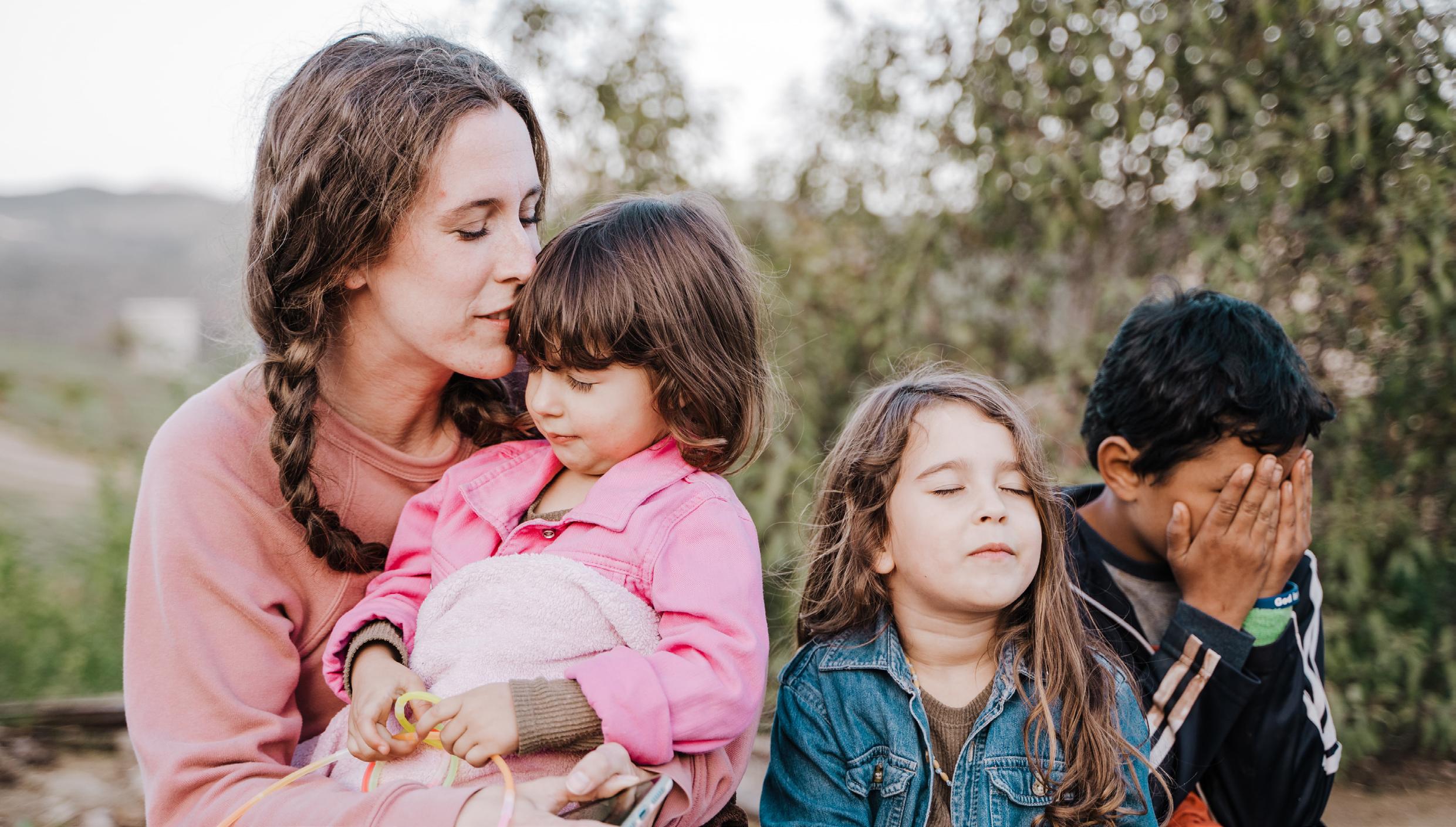
Authors
Relationships


Relationships
Relationships Australia receives funding from the Australian, State and Territory Governments and other agencies. We gratefully acknowledge this support which assists us to provide relationships services.
© Relationships Australia Inc.
This work is copyright. You may download, display, print and reproduce this material in unaltered form only (retaining this notice) for your personal, non-commercial use or use within your organisation. All rights are reserved. Requests and enquiries concerning reproduction rights should be addressed to: National Executive Officer
Relationships Australia PO Box 5046 Kingston ACT 2604
www.relationships.org.au
First edition, October 2005
Second edition, August 2007
Third edition, September 2013 Fourth edition, July 2016
Divorce and separation are painful for everyone involved – particularly children. At this challenging time children need support, love and contact with both parents.

Some certainty about the future is also very important for everyone. A written parenting plan, worked out between parents, will help
clarify the arrangements you need to put in place to care for your children. The plan can include shared parental responsibility for major long-term decision making and the time children spend with each parent. It will help everyone involved to know what is expected of them and it will be a valuable reference as time passes and circumstances change.
A parenting plan puts the best interests of the child first. It is drawn up in good will with a shared commitment to your children and their future firmly in mind.
A parenting plan is a written agreement between parents covering practical issues of parental responsibility. It is not legally enforceable; however it can have legal implications (see page 5).
Your plan will detail practical decisions about children’s care in such areas as:
• parenting style
• living arrangements
• finances
• religion
• education
• health care
• emotional well-being.
What is not covered in a Parenting Plan?
A parenting plan does not cover how you intend to divide up your cash, homes and assets. You should discuss these matters with
a mediator or lawyer who provides property settlements.
Plans can be worked out personally between the parents, or with the assistance of a Family Dispute Resolution Practitioner. This can be done face-to-face, by telephone, video conference or email.
Share the Care is a write-in resource to help you work out your individual plan.
Your plan will be unique to you as parents. It should be practical, simple and as concrete as possible. The more detailed or complex it is, the more you may need to review it.
We have provided questions for you to think about and examples to assist you in working out your own approach. These are not prescriptive.
Family dispute resolution is a process in which a Family Dispute Resolution Practioner, an independent person, helps people experiencing separation or divorce resolve their differences with each other.
Consider also including the children in this process. This can:
• give you an insight into your children’s thoughts
• provide insight into their developmental needs which can be reflected in your parenting plan
• assist in reducing parental conflict.
As your circumstances change, your plan may need to be changed in order to reflect:
• changes you have already discussed but not yet committed to writing
• changes to Australian Family Law
• children’s changing developmental needs, for example - 0 to 4 years every 9 months - 4 to 12 years every 12 months - 12+ years every 2+ years.
This is appropriate when:
• all parties agree it would be helpful
• the children have not already been asked to tell their stories and thoughts.
In these sessions, children can talk about how they are managing and what is important to them. At no time, however, should a child be asked to make difficult decisions.
Reviews can be done at any time providing you both agree and some parents prefer not to set a formal review date. However the agreement on page 7 allows you to set a date for review where you both agree to do so.
A parenting plan can take any form, but to be a parenting plan under the Family Law Act it must be made free from any threat, duress or coercion. It must be in writing and signed and dated by both parents. However a parenting plan is not legally enforceable.
If both parents agree on arrangements, you can submit your parenting plan to the Court using the Court’s Application for Consent Orders form. The details of your parenting plan are then built into a Parenting Order, giving it the same legal effect as an order made after a Court hearing.
If you cannot agree on arrangements for children you may need to have the Family
Court decide and issue you a Parenting Order. In deciding parenting arrangements the Court must always consider:
• the best interests of the child
• the extent to which both parents have complied with their obligations in relation to the child, which may include those set out in a parenting plan (if any).
Parenting Orders are one form of consent order issued by the Court. (Other types of consent orders relate to property settlement, spousal maintenance and child support).
Parenting Orders made on or after 1 July 2006 can be changed by parents preparing a new parenting plan (unless the Parenting Order says otherwise).
This makes it easier for parents to agree on changes without going back to Court.
Your new parenting plan may add to, replace part or all of the Parenting Order. However the changes made are not enforceable unless you apply to the Court for new consent orders (as above).
Some parents consult a lawyer regarding their parenting plan. This way they can explore the possible legal effects of the plan and inquire about other matters.
The Family Court, your state law society or legal aid service can all assist. Refer to the contacts at the back of this booklet.
Use the sheets at the back of the plan to record future commitments or plans involving the children.
Your completed plan
When you have completed your parenting plan, both parents should sign and date it. You should each retain a copy for future reference.
We are the parents of:
(child’s name) (date of birth)
(child’s name) (date of birth)
(child’s name) (date of birth)
(child’s name) (date of birth)
We respect each other as parents and our significance in the lives of our children.
We have drawn up this parenting agreement to assist us in providing a loving, stable and nurturing environment for our children, consistent with their developmental levels and our social and economic circumstances.
We recognise our children’s right to:
• emotional and physical safety, stability and security
• feel loved by both of us and significant family members
• know and be cared for by both of us and significant family members
• develop independent and meaningful relationships with each of us.
As parents we accept responsibility for:
• our children’s physical care
• our children’s emotional stability
• our children’s changing needs as they grow and mature
• protection of our children so they are not exposed to harmful parental conflict
• cooperation with each other to make decisions in our child’s best interests.
We have an existing parenting plan dated
We will review this plan on [insert date]
(optional, see page 4)
(signature of parent) (date)
Having children links you together as parents forever. The challenge is to make your relationship and communication as constructive as possible for the benefit of the children.
Solid ground rules about how you communicate with each other and with your children are a good foundation for your parenting plan.
Family dispute resolution may be valuable in assisting you with this part of your plan.
Is it better to discuss matters in a regular meeting, by telephone, video conference, text messaging, email or other means? Use what has worked best in the past or try something new.
Respect
Agree on ground rules for respectful communication. For example when is it ok to call each other and when is it not? What notice is reasonable if one of you has to change contact arrangements due to sickness or work commitments?
Religion, values and principles
It is useful to discuss some of the values and principles that you agree are important in bringing up your children. You can then document these as part of your parenting plan. Changing children’s names or religion are examples.
Major decisions, such as shifting house or moving schools affect your children greatly. The arrival of a new partner is another important adjustment for the children. You may agree to discuss these major decisions together before you finalise them. This may include making or changing wills and providing for guardianship in the case of death.
Contact
you are apart
Being separated means that your children are nearly always away from one of you. You need to keep communication going even when you are not physically present. Children need to know you care. At the same time it is important that you don’t make children messengers between you.
Grandparents can contribute enormously to the quality of life and emotional wellbeing of children. They may provide important support and stability in what may seem like a child’s uncertain world.
Consider how grandparents will continue to play their part in the lives of your children and how you will include them in your parenting plan.
Other relatives, in-laws and friends
When you split up it is easy to lose contact with relatives and significant family friends who provide support, encouragement and stability to your children. Think about how you can keep these relationships going.
• Focus on the children, not on your past relationship.
• Children can cope with different rules as long as they are clear about what they are.
• Children can be very worried about new partners in their parents’ lives. Be sensitive to their fears and anxieties.
• Don’t discuss the children’s affairs at changeover time, particularly if you don’t communicate well.
• What parenting decisions need our joint consultation?
• What parenting decisions don’t need consultation?
• How are we going to conduct ourselves in front of the children when we get together? We want them to know we are cooperating with them in mind.
• How are we going to share important information, eg school reports, health care?
• Do we need regular meetings to discuss parenting issues?
• At what times is it ok to call the other parent and when is it not?
• How will we resolve disagreements?
• Should we discuss how we talk to the children about the other parent?
• What do we do about emergencies (eg, medical, dental, accidents)?
• How will we make sure our children remain in contact with supportive friends or relations from the ‘other side’ of the family?
• How will we let each other know when a child is in trouble?
• What happens if one of us dies? Both?
• How will we introduce new partners to our children’s lives?
• We will not make negative comments to our children about the other parent.
• We agree not to make big changes like moving house without discussing them with each other.
• We will not change Emma’s last name without discussing it with the other parent.
• We will not plan activities with our children during their other parent’s time.
• We will give each other a minimum of 24 hours notice if one of us needs to change contact arrangements.
• In an emergency, the parent who is in charge, or who gets the call will handle immediate arrangements; they will phone the other parent as soon as practicable.

• Each of us will be responsible for organising contact between our children and our side of the extended family.
• We will not pass messages to each other through our children.
• We agree not to argue in front of the children or anywhere they could hear us.
Shared parenting is not just about the amount of time each child spends with each parent. The amount of time spent should allow the relationship to be meaningful. Children should be encouraged to see each parent as equally important in their lives even if they do different activities with each.
You will need to agree on the periods of time children will spend with each parent. Children’s ages and school situations, and parents’ employment and availability are considerations in your decision-making.
Except where there are issues of violence or abuse, the law presumes that it is in the best interests of a child for parents to have equal shared parental responsibility. Consider equal time if you both agree that this is in the best interest of the children.
If it is not appropriate for your child to spend equal time with both of you, consider an arrangement that allows each of you to spend substantial and significant time with the child. This refers to a child spending time with each parent over a mix of weekends, holidays and regular days and nights. This way you are both involved in the child’s daily routine, as well as sharing special events and other events of significance. The year planner at the back of this booklet can be used to record arrangements, special days etc.
Children lead busy lives and you will need to make arrangements to support their activities. Keeping up with their sporting and other activities is critical to their social development and to good co-parenting. This can involve transport and supervision for such events as sleepovers. If they are travelling on holidays, arrangements will need to be made to collect and return them.
It is important for children that changeovers go smoothly. They will sense any conflict between you.
Find ways to smooth the path, if necessary by arranging to meet each other at a neutral location outside the home. Some people may find it useful to use a Children’s Contact Service.
of the
When child care or baby-sitting is required, appropriate supervision must be arranged by the parents. You can discuss child care and also whether the other parent would be the first choice to care for the children when baby-sitting is required.
Housekeeping
With children spending time in different homes, some housekeeping arrangements may need to be spelt out, such as responsibility for washing clothes, meals and sharing belongings between households.
On special days, arrangements will need to be made for children to spend time with each parent, both parents, or relatives, such as grandparents, for example on:
• days of religious significance, eg Christmas, Chinese Lunar New Year
• parents’ birthdays
• child’s birthday
• Father’s Day and Mother’s Day
• holidays
• other important days in the family
• Think of your children having two homes, one with you and one with their other parent.
• If children can’t have their own rooms, give them a space they can call their own with furniture, toys and photos.
• Make changeovers as natural and friendly as possible.
• Some children are very angry about separation and may show a range of emotional or behavioural responses. Give it time and patience.
• Agree on a period of notice for changing arrangements.
• Plan ahead, be reliable and do what you say you’ll do.
• How much time can each child spend with each parent?
• What days can they be with each of us?
• What age will the children need to be before we agree on unaccompanied travel by air/bus?
• What different ideas are there for maintaining close and meaningful contact even when children and parents are separated for long periods of time?
• Will there be a main place where the children will live, and if so, where will it be?
• If neither of us is able to look after the children, who will be the alternative carers? What about school holidays?
• Are there times when it is not convenient to ring my children?
• How will we manage contact when one parent works long hours?
• Who will wash the children’s clothes?
• What clothes and other belongings will be taken and returned at changeover?
• How will we arrange pick up and drop offs?
• Who will take them to regular sporting engagements on weekends? After school?
• If they are ‘sleeping over’ somewhere how can we make sure they are safe?
• Our children will spend equal time with each parent. One week with one parent and one week with the other parent.

• Our children will live with Pat. They will go to Alex’s place every second week. Alex will pick them up at 6.00pm following after-school care on Fridays from the school and will return them to school on Monday mornings.
• Anne is doing year 12. To minimise disruption to her studies she will live with one parent for the major part of the week, and will see her other parent on Saturday or on another day arranged between them.
• Our children will spend Christmas lunch every year with Dad and go to Mum’s at 5.00pm for the evening meal.
• When the children are with one parent, the other parent will ring between 6.00pm and 8.00pm each night.
• We will encourage our children to ring the other parent once every day when they are apart.
• Jimmy’s grandparents will take him to soccer every Saturday and return him after lunch.
• If our new partners are picking up the children we will phone each other first to tell them.
• For our changeovers, we will meet at 4.00pm at the school.
• Our children will live with Alex and spend most of the summer holidays and two weeks in one of the other holidays with Pat.
• Our children live with Dad and spend all but two weeks of the holidays with Mum.
(use the Year Planner at the rear to plan dates ahead)
Negotiating clear and detailed financial arrangements can save conflict and stress further down the track. Discuss the tips, refer to the check-list, then write down your decisions. Negotiating finances can become complex. Use family dispute resolution if you can’t agree. Relationships Australia can help.
Living arrangements for children can have an impact on child support, income support and family assistance payments.
Your parenting plan can provide for child support but these provisions will have no effect and not be enforceable until they have been accepted by Services Australia (Child Support) as a child support agreement.
• Agree on the easy things first.
• Think of yourselves as business partners working together for the sake of the children.
• Different ways of paying child support can be arranged. Contact Services Australia (Child Support) and Centrelink.
• Focus on the children’s needs and try not to become involved in discussions about each other’s lifestyle.
• Decisions such as selling your house and dividing the proceeds should not be considered in this plan. These one-off permanent decisions following separation belong in a Property Settlement and should be discussed with a lawyer.

• What do other children of the same age get?
• What will your child be expected to spend this on?
• Who will provide the pocket money and when?
• Does your child have a bank account and do you expect him or her to save?

• We will share all costs 50/50.
• One parent will pay pocket money; the other will pay for Alison’s mobile phone plan with amounts negotiated with children direct.
• Both parents will negotiate unforeseen expenses as they come up.
• One parent will pay health insurance; the other will pay school expenses including fees and books.
• School excursions and camps to be split 50/50.
• We will review our financial arrangements at the end of every calendar year.
Changing schools can be very disruptive for children. To achieve continuity and stability, consider leaving schooling arrangements unchanged until the end of the school year.
If you live apart it may be necessary for children to attend a new school.
This raises questions such as
• which school?
• private or public?
• who pays the school fees?
• Offer to help with school events like fundraising, working bees and committees or helping at sports day. Children generally love having their parents involved at school.
• Make contact with your child’s classroom teacher and discuss your new circumstances.
• Make sure the school has both your contact details.
• Getting the school to send notices, reports and other material related to my child’s progress to both of us.
• How can we get involved?
• Making contact with school counsellors so that they will be aware of your separation and its possible consequences for the children.
• We agree to make joint decisions on where our children will go for their primary and secondary schooling.
• We will discuss changing Ben’s school after October once everyone’s living arrangements are clearer.
• Each parent will spend two hours a week helping in Meg’s kindergarten.
• Each parent will arrange for the school to send us both copies of our children’s reports.
Any other issues that you may wish to include.
Compile a list of emergency numbers for your children.
Parent 1 Home: Work: Mobile:
Parent 2
Home: Work: Mobile:
Relatives (grandparents, aunts, uncles, cousins)
Name 1: Home: Work: Mobile:
Name 2:
Home: Work: Mobile:
School (teachers, counsellors, pre or after school care)
Friends
Sport or classes (coaches, teachers etc)
Healthcare (doctor, dentist, optician, specialists)
Other
Police Fire Ambulance
Chemist Hospital Other
Doctor Poison Information Centre Other
Medical records for:
Vaccinations Significant past illnesses
Latest tetanus booster Operations/ general anaesthetic Allergies
Antibiotics ok?
Medicare number Health fund number
Medical records for:
Vaccinations Significant past illnesses
Latest tetanus booster Operations/ general anaesthetic Allergies
Antibiotics ok?
Medicare number Health fund number
Medical records for:
Vaccinations Significant past illnesses
Latest tetanus booster Operations/ general anaesthetic Allergies Antibiotics ok?
Medicare number Health fund number
Medical records for:
Vaccinations Significant past illnesses
Latest tetanus booster Operations/ general anaesthetic Allergies
Antibiotics ok?
(name)
(name)
(name)
(name)
Family Services Australia: 1300 365 859 Child Care Access Hotline: 1800 670 305
Family Relationship Advice Line: 1800 050 321 Services Australia: www.servicesaustralia.gov.au
Family Relationships Online: www.familyrelationships.gov.au Family Services Australia: 1300 365 859
Federal Circuit Court of Australia: 1300 367 110 www.federalcircuitcourt.gov.au Financial Counselling: 1800 050 321 Interpreter services: 13 14 50 Lifeline Australia: 13 11 14 www.lifeline.org.au Mensline: 1300 789 978 www.menslineaus.org.au
Parenting websites:
Parent Link www.parentlink.act.gov.au Parenting SA www.parenting.sa.gov.au
Parenting Australia www.parentingaustralia.com.au Raising Children www.raisingchildren.net.au Department of Social Services www.families.gov.au Family & Community Services NSW www.facs.nsw.gov.au Local Government, Sport and Cultural Industries WA www.dlgsc.wa.gov.au/ Family Law Section www.familylawsection.org.au Australian Chilhood Foundation www.childhood.org.au
Relationships Australia
• Family Dispute Resolution Services
• Counselling
1300 364 277 relationships.org.au
• Education Services
• Children’s Contact Services
Relationships Australia provides counselling, mediation, courses in family violence prevention, relationship skills, family skills and parenting, and other relationship services. We have branches across all states and territories of Australia.